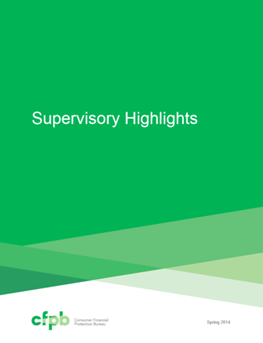2.3 Short-term, small-dollar lending
The Dodd-Frank Act gave the CFPB supervisory and enforcement authority over payday lenders, which generally provide short-term, small-dollar loans directly to consumers. The CFPB officially launched its payday lending supervisory program in January 2012, marking the first time these lenders have been subject to Federal compliance examinations.
18 15 USC 1692-1692p.
15 SUPERVISORY HIGHLIGHTS
The payday examination findings described below cover CMS shortcomings and illegal debt collection practices, as well as unfair, deceptive or abusive acts or practices in violation of the Dodd-Frank Act.
2.3.1 Compliance management issues Though some lenders have demonstrated a commitment to building a strong compliance management system by dedicating increased staff and resources to compliance, CFPB examinations have found that a number of payday lenders have not implemented effective compliance management systems. Some payday lenders have been unable to fully respond to CFPB information requests or examiner inquiries on-site.19 Generally, however, CMS concerns covered a range of issues, including lack of oversight of compliance management programs, ineffective oversight of third-party service providers, inadequate complaint management, failure to adopt appropriate written policies and procedures, failure to adequately train staff, and lack of effective compliance audit programs.
In a number of the institutions reviewed, the leadership did not hold personnel accountable for compliance or oversee the compliance program. Additionally, certain lenders failed to properly oversee third-party service providers, which contributed to violations of the Fair Debt Collections Practices Act and the Dodd-Frank Act prohibition of unfair, deceptive, or abusive acts or practices. Many contracts examined by CFPB examiners between payday lenders and third-party service providers contained no specific compliance-related expectations, and some did not include any reference at all to compliance responsibilities. Further, a number of lenders lacked adequate processes for analyzing the root causes of complaints and for monitoring the resolution of complaints.
19 In one instance, a lender, Cash America, impeded an examination by failing to properly retain documents requested by the CFPB, destroying documents after being ordered to cease, removing materials from call centers regarding sales and collections metrics, and coaching call center employees to de-emphasize the sales aspect of their duties. These actions contributed to the CFPB’s order in November 2013 that Cash America pay $5 million to the CFPB’s Civil Penalty Fund, in addition to $14 million refunded to consumers harmed by Cash America’s violations of Federal consumer financial law. The Cash America consent order can be found here:
Cashamerica Consent Order See also Supervisory Highlights: Winter 2013, Section 2.2.1: Public Enforcement Actions, available at: Supervision Highlights
16 SUPERVISORY HIGHLIGHTS
Examiners also identified weaknesses in policies and procedures, training programs, and compliance audit programs. While examinations have found lenders that regularly review and revise their policies and procedures, many examinations found multiple weaknesses in this area. For instance, one branch manager indicated that the branch received no policies regarding electronic payments, and therefore, branch employees created their own policies with no corporate oversight. More than one lender provided examiners with undated policies, or policies dated at or after the start of the CFPB examination, making it impossible to determine when they were drafted and/or updated, and leading examiners to believe that no such policies existed prior to the examination. At multiple lenders, policies and procedures for record retention either did not exist or were not followed, leading to incomplete record destruction logs and improperly destroyed records.20
As noted above, all entities should implement training programs that are robust enough to provide effective and comprehensive instruction to personnel. At multiple lenders, training programs were nonexistent or missing vital components, such as applicable Federal consumer financial laws and instruction on how to avoid unfair, deceptive, or abusive acts or practices.





